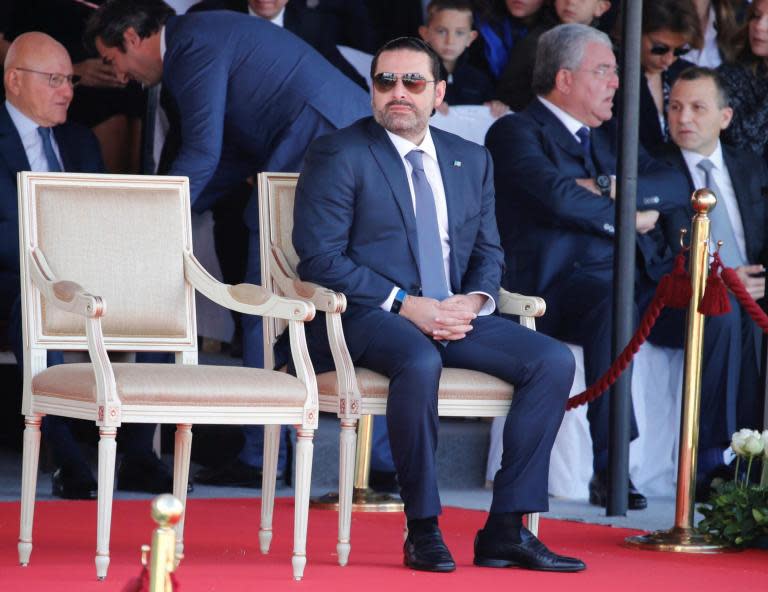Lebanese Prime Minister Saad Hariri says resignation on hold awaiting talks
Lebanon’s Prime Minister Saad al-Hariri has said that he has put his resignation “on hold” pending talks with the rest of the Lebanese government – a reversal which led to celebrations on the streets of Beirut.
In a televised speech on Wednesday after a parade for Lebanese Independence Day, Mr Hariri said he had offered his resignation to President Michel Aoun as planned, but accepted the President’s suggestion to “postpone” the decision.
“Our beloved nation needs in this critical period exceptional efforts from everyone to protect it in the face of dangers and challenges,” Mr Hariri said from the presidential palace, vowing to remain in the country.
“[President Aoun] urged me to wait before offering [my resignation] and to hold onto it for more dialogue about its reasons and political background, and I showed responsiveness.”
By midday, around 2,000 Hariri supporters had converged on his residence in central Beirut in a spontaneous show of support, waving Lebanese flags and singing.
“There is nothing more precious than our country,” he told the crowd. “I am staying with you and I will keep going with you to be the first line of defence of Lebanon, its stability and its Arab nature.”
Mr Hariri repeated a phrase he has used several times since his shock resignation: “Lebanon first”.
The Sunni Future Movement (FM) party leader arrived home in Beirut late on Tuesday night after almost three weeks abroad following his 4 November surprise decision to resign from Riyadh, a move many believe was ordered by Saudi Arabia.
President Aoun had previously refused to accept Mr Hariri’s resignation unless it was offered in person. Last week he publicly accused Riyadh of breaking the Vienna Convention over the Prime Minister’s alleged detention.
Mr Hariri’s announcement goes someway towards easing the political crisis which tossed Lebanon to the forefront of the regional struggle for dominance between Saudi Arabia and Iran – which backs Lebanese militant group Hezbollah.
The reversal, however, is likely to displease the Kingdom. The Prime Minister and Saudi authorities have denied his resignation was forced or that he remained in Riyadh for so long against his free will.
His decision was ostensibly triggered by fears of assassination – the fate which befell his father, the much more popular Prime Minister Rafic Hariri, in 2005 – and a protest against Hezbollah’s growing power both at home and over the border, where it is fighting in Syria’s civil war as well as Iraq and Yemen.
Many observers, however, believe Riyadh has grown impatient with the Prime Minister’s inability to contain Hezbollah, and seeks to derail Lebanon’s coalition government.
“Putting the resignation on hold now means there is still room for backdoor negotiations to try and figure a way out of [the current crisis],” said Maha Yahya, director of the Beirut-based Carnegie Middle East Centre, adding that there seems to be an international understanding not to “push this country over the precipice”.
In Wednesday’s speech Mr Hariri reiterated the need for Lebanon to remain neutral on regional disputes and conflicts “and all that undermines internal stability and brotherly relations with Arab brothers”.
Lebanon has largely managed to avoid the bloodshed which has consumed much of the Middle East since Arab Spring protests began in 2011.
His eventual return to Lebanon came after mediations by French President Emmanuel Macron. The Prime Minister flew to Paris for a few days with brief stops in Cairo and Cyprus before finally returning to Beirut on Tuesday, almost three weeks after he was summoned to Riyadh.

 Yahoo News
Yahoo News 

